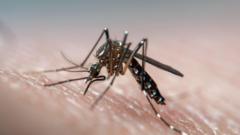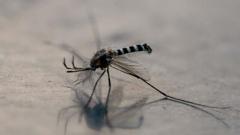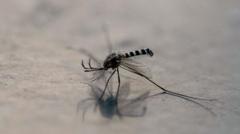Groundbreaking research from the University of California, Irvine and Santa Barbara shows that altering the hearing capability of male Aedes aegypti mosquitoes may significantly curtail their mating success, providing a novel strategy to combat mosquito-borne diseases like dengue.
Innovative Approach to Combat Dengue: Making Male Mosquitoes Deaf

Innovative Approach to Combat Dengue: Making Male Mosquitoes Deaf
Researchers at the University of California develop a genetic method to disrupt mating among male mosquitoes, aiming to reduce disease transmission.
Scientists have recently unveiled an innovative method to tackle mosquito-borne illnesses such as dengue, yellow fever, and Zika by rendering male mosquitoes deaf, which hampers their ability to mate. The male mosquitoes typically rely on sound, specifically the wingbeats of females, to locate them in mid-air, a critical component of their mating ritual. By manipulating a genetic pathway crucial for their hearing, researchers made it nearly impossible for modified males to successfully engage with females, even after being confined together for several days.
The study focused on Aedes aegypti mosquitoes, notorious for transmitting viruses to hundreds of millions globally. The researchers meticulously analyzed the mating patterns of these insects, which generally last from a few seconds to nearly a minute. They successfully identified a way to disrupt these patterns through genetic alterations that targeted a protein called trpVa, known to play a vital role in sound detection.
In experiments, the genetically altered male mosquitoes exhibited a complete lack of response to the auditory signals emitted by potential mates, effectively falling on “deaf ears.” In stark contrast, wild male mosquitoes engaged in multiple mating attempts and successfully fertilized nearly all the females present in their enclosure. The findings, published in the journal PNAS, highlighted that the absence of mating among the deafened males was absolute.
Dr. Joerg Albert, a mosquito mating specialist from the University of Oldenburg in Germany, commented on the study's implications, emphasizing that targeting the auditory senses could represent a promising avenue for mosquito control. However, he noted that further research is essential to ensure effective management of this approach. "The study offers a direct molecular test indicating that sound is not just significant for reproduction, but crucial for the survival of male mosquitoes,” Albert remarked.
While this genetic strategy introduces an innovative control method, researchers also consider alternatives, such as releasing sterile males in areas with high mosquito population densities. It is crucial to note that, despite their role in disease transmission, mosquitoes play a vital role in many ecosystems, serving as food for various species and acting as pollinators.









